新目标英语中考总复习:06介词用法讲解(含2019真题及巩固练习答案解析)
文档属性
| 名称 | 新目标英语中考总复习:06介词用法讲解(含2019真题及巩固练习答案解析) | 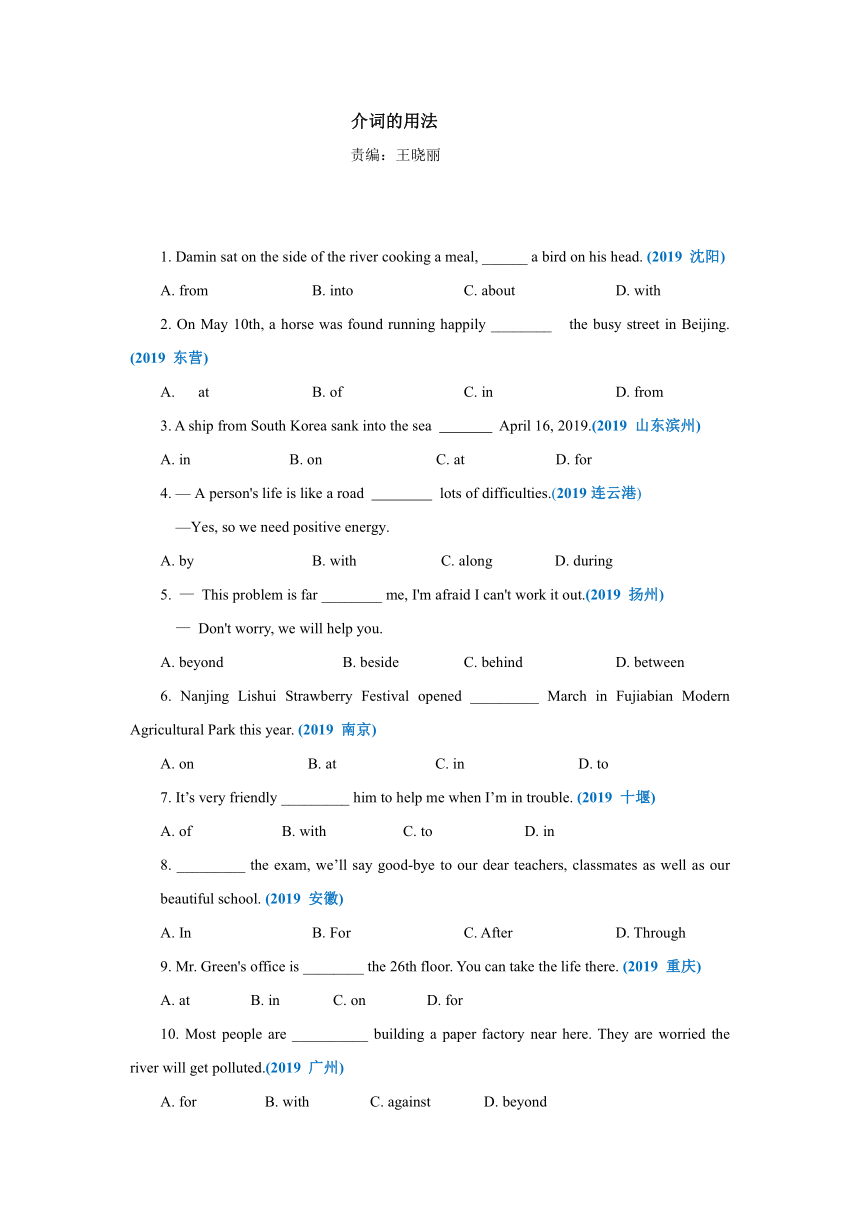 | |
| 格式 | zip | ||
| 文件大小 | 49.9KB | ||
| 资源类型 | 教案 | ||
| 版本资源 | 人教新目标(Go for it)版 | ||
| 科目 | 英语 | ||
| 更新时间 | 2019-11-05 10:12:59 | ||
图片预览

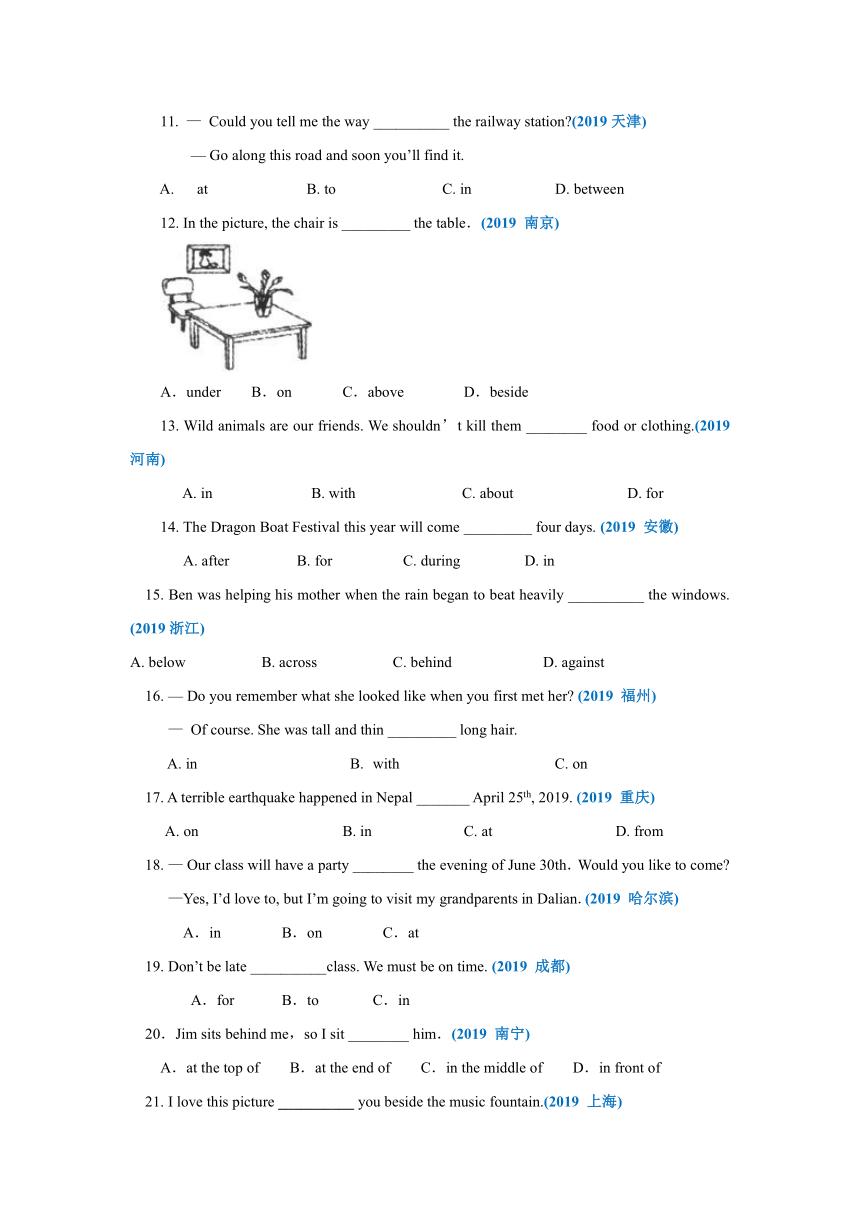
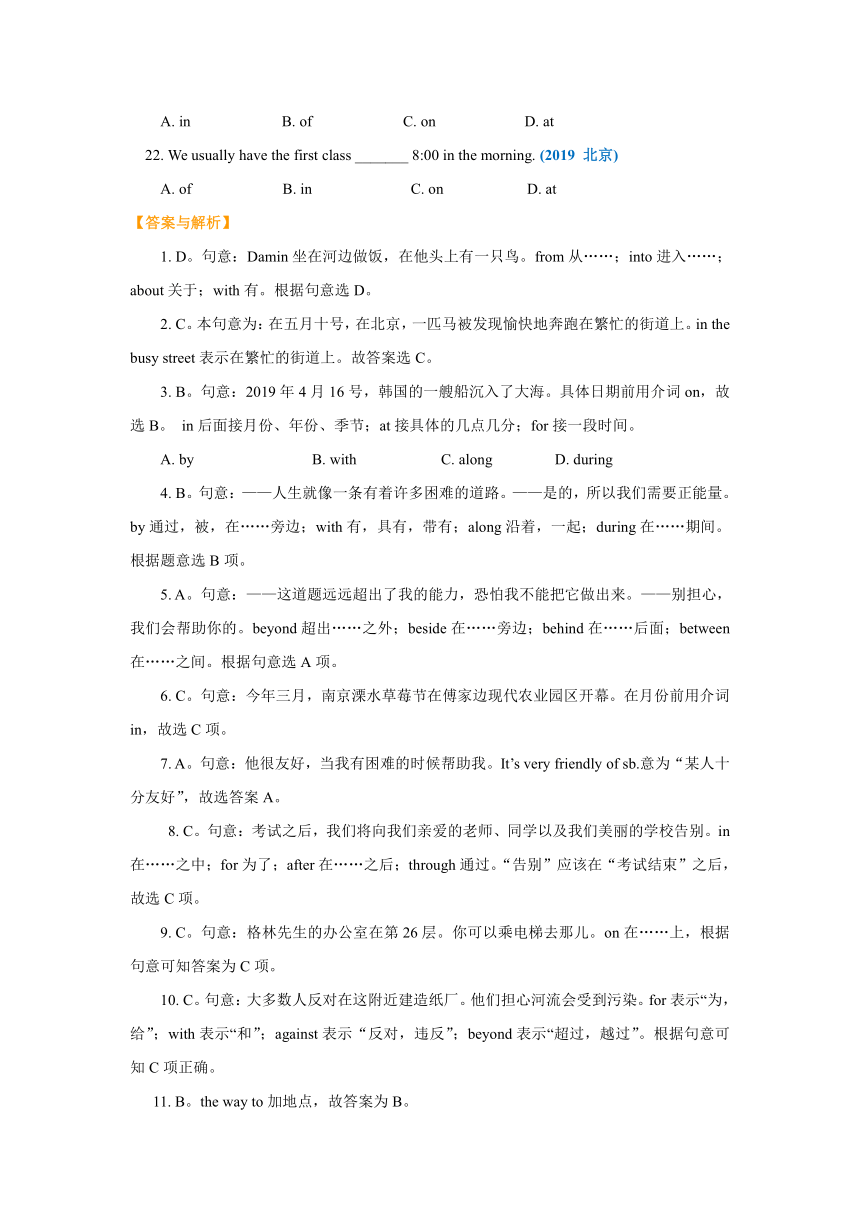
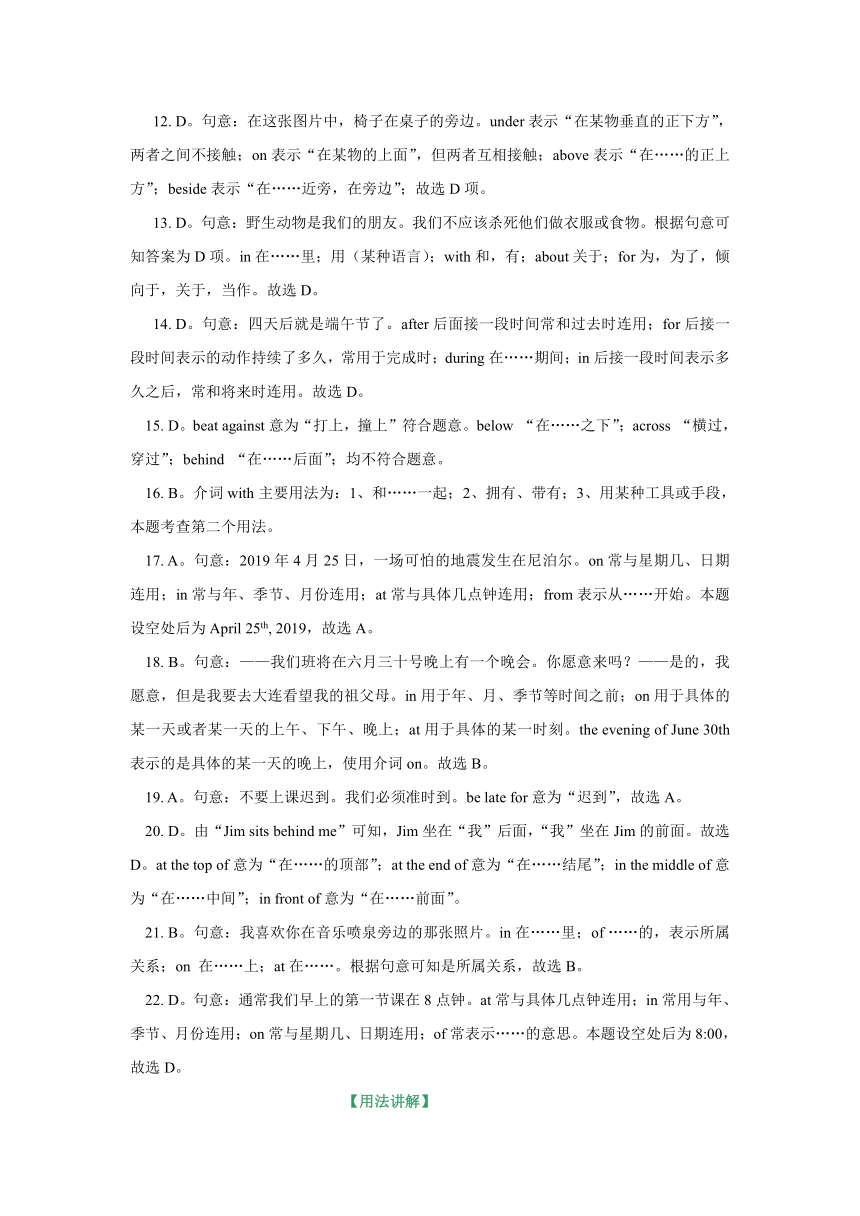
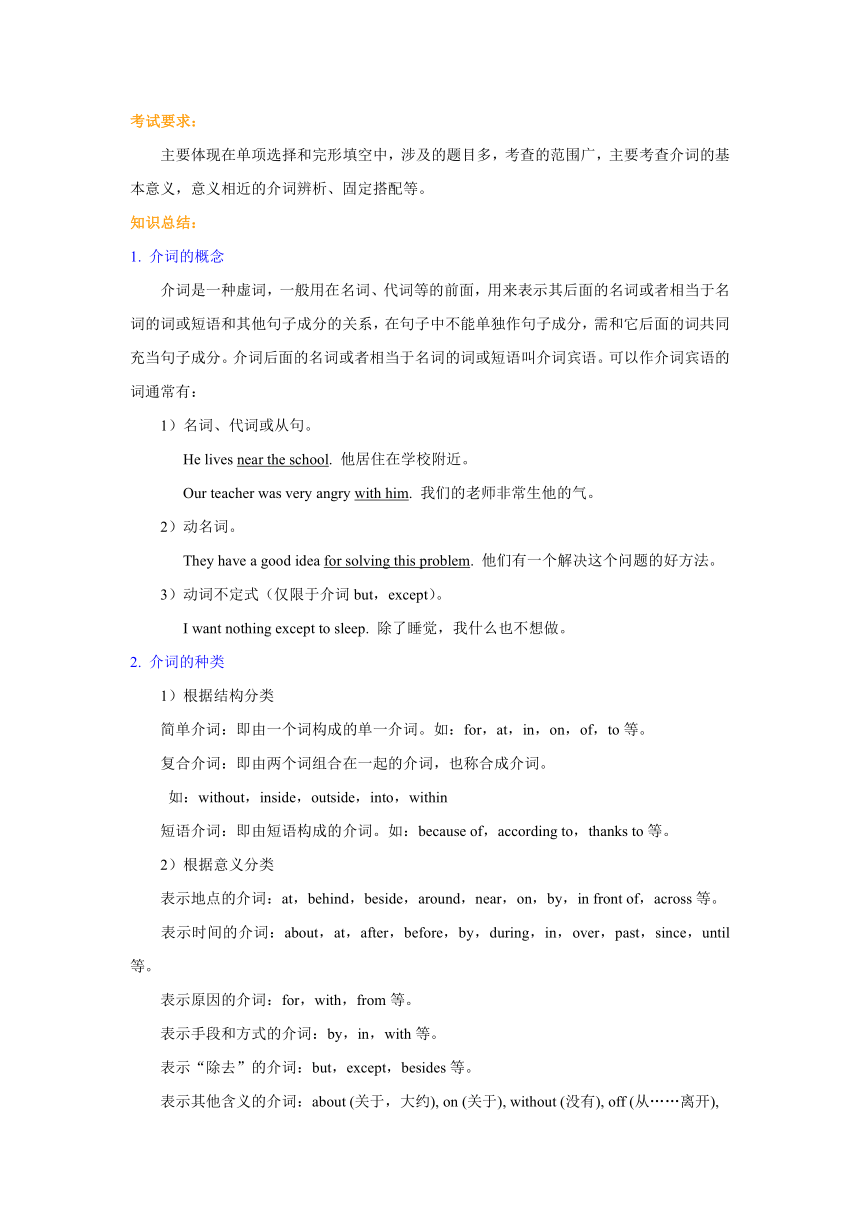
文档简介
介词的用法
责编:王晓丽
1. Damin?sat?on?the?side?of?the?river?cooking?a?meal,?______?a?bird?on?his?head. (2019 沈阳)
A.?from? B.?into? C.?about? D.?with
2. On May 10th, a horse was found running happily ________ the busy street in Beijing. (2019 东营)
A. at B. of C. in D. from
3. A ship from South Korea sank into the sea April 16, 2019.(2019 山东滨州)
A. in B. on C. at D. for
4. — A person's life is like a road lots of difficulties.(2019连云港)
—Yes, so we need positive energy.
A. by B. with C. along D. during
5. — This problem is far ________ me, I'm afraid I can't work it out.(2019 扬州)
— Don't worry, we will help you.
A. beyond B. beside C. behind D. between
6. Nanjing Lishui Strawberry Festival opened _________ March in Fujiabian Modern Agricultural Park this year. (2019 南京)
A. on B. at C. in D. to
7. It’s very friendly _________ him to help me when I’m in trouble. (2019 十堰)
A. of B. with C. to D. in
8. _________ the exam, we’ll say good-bye to our dear teachers, classmates as well as our beautiful school. (2019 安徽)
A. In B. For C. After D. Through
9. Mr. Green's office is ________ the 26th floor. You can take the life there. (2019 重庆)
A. at B. in C. on D. for
10. Most people are __________ building a paper factory near here. They are worried the river will get polluted.(2019 广州)
A. for B. with C. against D. beyond
11. — Could you tell me the way __________ the railway station?(2019天津)
— Go along this road and soon you’ll find it.
A. at B. to C. in D. between
12. In the picture, the chair is _________ the table.(2019 南京)
A.under B.on C.above D.beside
13. Wild animals are our friends. We shouldn’t kill them ________ food or clothing.(2019 河南)
A. in B. with C. about D. for
14. The Dragon Boat Festival this year will come _________ four days. (2019 安徽)
A. after B. for C. during D. in
15. Ben was helping his mother when the rain began to beat heavily __________ the windows. (2019浙江)
A. below B. across C. behind D. against
16. — Do you remember what she looked like when you first met her? (2019 福州)
— Of course. She was tall and thin _________ long hair.
A. in B. with C. on
17. A terrible earthquake happened in Nepal _______ April 25th, 2019. (2019 重庆)
A. on B. in C. at D. from
18. — Our class will have a party ________ the evening of June 30th.Would you like to come?
—Yes, I’d love to, but I’m going to visit my grandparents in Dalian.(2019 哈尔滨)
A.in B.on C.at
19. Don’t be late __________class. We must be on time. (2019 成都)
A.for B.to C.in
20.Jim sits behind me,so I sit ________ him.(2019 南宁)
A.at the top of B.at the end of C.in the middle of D.in front of
21. I love this picture __________ you beside the music fountain.(2019 上海)
A. in B. of C. on D. at
22. We usually have the first class _______ 8:00 in the morning. (2019 北京)
A. of B. in C. on D. at
【答案与解析】
1. D。句意:Damin坐在河边做饭,在他头上有一只鸟。from从……;into进入……;about关于;with有。根据句意选D。
2. C。本句意为:在五月十号,在北京,一匹马被发现愉快地奔跑在繁忙的街道上。in the busy street表示在繁忙的街道上。故答案选C。
3. B。句意:2019年4月16号,韩国的一艘船沉入了大海。具体日期前用介词on,故选B。 in后面接月份、年份、季节;at接具体的几点几分;for接一段时间。
A. by B. with C. along D. during
4. B。句意:——人生就像一条有着许多困难的道路。——是的,所以我们需要正能量。by通过,被,在……旁边;with有,具有,带有;along沿着,一起;during在……期间。根据题意选B项。
5. A。句意:——这道题远远超出了我的能力,恐怕我不能把它做出来。——别担心,我们会帮助你的。beyond超出……之外;beside在……旁边;behind在……后面;between在……之间。根据句意选A项。
6. C。句意:今年三月,南京溧水草莓节在傅家边现代农业园区开幕。在月份前用介词in,故选C项。
7. A。句意:他很友好,当我有困难的时候帮助我。It’s very friendly of sb.意为“某人十分友好”,故选答案A。
8. C。句意:考试之后,我们将向我们亲爱的老师、同学以及我们美丽的学校告别。in在……之中;for为了;after在……之后;through通过。“告别”应该在“考试结束”之后,故选C项。
9. C。句意:格林先生的办公室在第26层。你可以乘电梯去那儿。on在……上,根据句意可知答案为C项。
10. C。句意:大多数人反对在这附近建造纸厂。他们担心河流会受到污染。for表示“为,给”;with表示“和”;against表示“反对,违反”;beyond表示“超过,越过”。根据句意可知C项正确。
11. B。the way to加地点,故答案为B。
12. D。句意:在这张图片中,椅子在桌子的旁边。under表示“在某物垂直的正下方”,两者之间不接触;on表示“在某物的上面”,但两者互相接触;above表示“在……的正上方”;beside表示“在……近旁,在旁边”;故选D项。
13. D。句意:野生动物是我们的朋友。我们不应该杀死他们做衣服或食物。根据句意可知答案为D项。in在……里;用(某种语言);with和,有;about关于;for为,为了,倾向于,关于,当作。故选D。
14. D。句意:四天后就是端午节了。after后面接一段时间常和过去时连用;for后接一段时间表示的动作持续了多久,常用于完成时;during在……期间;in后接一段时间表示多久之后,常和将来时连用。故选D。
15. D。beat against意为“打上,撞上”符合题意。below “在……之下”;across “横过,穿过”;behind “在……后面”;均不符合题意。
16. B。介词with主要用法为:1、和……一起;2、拥有、带有;3、用某种工具或手段,本题考查第二个用法。
17. A。句意:2019年4月25日,一场可怕的地震发生在尼泊尔。on常与星期几、日期连用;in常与年、季节、月份连用;at常与具体几点钟连用;from表示从……开始。本题设空处后为April 25th, 2019,故选A。
18. B。句意:——我们班将在六月三十号晚上有一个晚会。你愿意来吗?——是的,我愿意,但是我要去大连看望我的祖父母。in用于年、月、季节等时间之前;on用于具体的某一天或者某一天的上午、下午、晚上;at用于具体的某一时刻。the evening of June 30th表示的是具体的某一天的晚上,使用介词on。故选B。
19. A。句意:不要上课迟到。我们必须准时到。be late for意为“迟到”,故选A。
20. D。由“Jim sits behind me”可知,Jim坐在“我”后面,“我”坐在Jim的前面。故选D。at the top of意为“在……的顶部”;at the end of意为“在……结尾”;in the middle of意为“在……中间”;in front of意为“在……前面”。
21. B。句意:我喜欢你在音乐喷泉旁边的那张照片。in在……里;of ……的,表示所属关系;on 在……上;at在……。根据句意可知是所属关系,故选B。
22. D。句意:通常我们早上的第一节课在8点钟。at常与具体几点钟连用;in常用与年、季节、月份连用;on常与星期几、日期连用;of常表示……的意思。本题设空处后为8:00,故选D。
【用法讲解】
考试要求:
主要体现在单项选择和完形填空中,涉及的题目多,考查的范围广,主要考查介词的基 本意义,意义相近的介词辨析、固定搭配等。
知识总结:
1. 介词的概念 介词是一种虚词,一般用在名词、代词等的前面,用来表示其后面的名词或者相当于名词的词或短语和其他句子成分的关系,在句子中不能单独作句子成分,需和它后面的词共同充当句子成分。介词后面的名词或者相当于名词的词或短语叫介词宾语。可以作介词宾语的词通常有: 1)名词、代词或从句。 He lives near the school. 他居住在学校附近。 Our teacher was very angry with him. 我们的老师非常生他的气。 2)动名词。 They have a good idea for solving this problem. 他们有一个解决这个问题的好方法。 3)动词不定式(仅限于介词but,except)。 I want nothing except to sleep. 除了睡觉,我什么也不想做。 2. 介词的种类 1)根据结构分类 简单介词:即由一个词构成的单一介词。如:for,at,in,on,of,to等。 复合介词:即由两个词组合在一起的介词,也称合成介词。
如:without,inside,outside,into,within 短语介词:即由短语构成的介词。如:because of,according to,thanks to等。 2)根据意义分类 表示地点的介词:at,behind,beside,around,near,on,by,in front of,across等。 表示时间的介词:about,at,after,before,by,during,in,over,past,since,until等。 表示原因的介词:for,with,from等。 表示手段和方式的介词:by,in,with等。 表示“除去”的介词:but,except,besides等。 表示其他含义的介词:about (关于,大约), on (关于), without (没有), off (从……离开), instead of (代替), with (和)等。 3. 介词短语的功能 介词和介词宾语一起构成介词短语。介词短语可以在句子中作下列成分: 1)作表语: She looks like an actress. 她看上去像演员。 What’s the book about? 这本书是讲什么的? 2)作宾语补足语: A cold kept him in bed for a week. 感冒使他卧床一周。 I found my mother on the bus. 我发现我妈妈在公交车上。 3)作状语: I will wait for you until tomorrow. 我等你到明天。 The teacher came into the classroom with a smile on her face. 那位老师面带笑容进了教室。 4)作定语: A friend in need is a friend indeed. 患难见真情。 4. 中考经常考查的几组介词的用法 1) 时间介词:at/ in/ on 表示具体的时间点(几点钟)前面用介词at。
I usually get up at six in the morning. 我通常在早上六点起床。 注意: at dinner time 在(吃)晚饭时 at night 在夜间 at weekends / the weekend 在周末 表示在特定的日子、某月某日、星期几、节日等时间的前面,或者某一天的早上、下午、晚上的前面用介词on。
We can play football on Sunday. 我们可以在星期天踢足球。 They came to my house on a cold winter morning.
他们在一个寒冷的早晨来到了我家。 表示较长的一段时间段的名词或短语前经常用in,如在早上、下午、晚上;在某月某年等。
I was born in May. 我出生在五月。 They came here in 1998. 他们在1998年来这里的。 What are you going to do in the winter holiday? 寒假你打算做什么? 注意: 表示上午、下午或晚上的名词前一般用介词in,但是具体到某一天的上午、下午或晚上用介词on。 in the morning 在上午 on Monday morning 在星期一的上午 2)时间介词:for,since for 和since引导时间状语都有延续之意。for +时间段表示“(延续)……之久”。since +时间点表示从过去某时延续到现在的一段时间。 They have lived in China for ten years. 他们在北京住了十年了。 She has worked here since last year. 从去年起她就在这里工作。 3)时间介词:in,after in+时间段表示从现在算起一段时间以后,一般用于将来时;after+时间段表示从过去算起一段时间后,一般用于过去时。另外after后也可以接具体时间用于将来时。 He’ll be back in three hours. 他三小时后回来。 He came back after three hours. 三小时后,他回来了。 He’ll be back after 3 o’clock. 他三点后会回来。 4) 方位介词:at,in,on,to 表示在某一点的位置或者具体的位置用at。
We will have a picnic at the foot of mountain. 我们在山脚下举行野餐。 表示在某一个范围之内的方位用介词in。 Shandong lies in the east of China. 山东省在中国的东部。(山东省在中国范围之内) 表示在某一个范围之外的方位用介词to。 Japan lies to the east of China. 日本在中国的东部。(日本在中国范围之外) 表示两者相互接触,强调在同一条线或者同一个平面上用介词on。 Shandong lies on the north of Jiangsu. 山东省在江苏省的北部。(两省接壤) 5) 地点介词:in/on / under/ above / over/ below 表示一个物体在另一个物体的上面用介词on。 There is a book on the desk. 课桌上有一本书。(书在课桌表面上) 表示一个物体在另一个物体的里面用介词in。 There are some dumplings in the bowl. 碗里有一些水饺。(水饺在碗里面) 表示一个物体在另一个物体的下方,用介词under。(一般为正下方) There is a ball under the chair. 椅子下面有一个球。(球在椅子的下面) below意思是“在……之下”,所指范围较宽,不一定在某物的正下方。
From the plane, we could see the whole town below us. 从飞机上我们可以看到下面城镇的全貌。 表示一个物体在另一个物体的上方,并非有“垂直之上”的含义,用介词above, 其反义词为below。 His room is above ours. 他的房间在我们的上面。 表示一个物体在另一个物体的正上方用介词over,有时有“覆盖;越过”之意。 His room is over ours. 他的房间就是我们头上的那间。 There is a big bridge over the river. 河上有一座大桥。(桥在河的上面) 6) 方位介词between,among between是表示在两者之间;among表示在三者或者三者以上之间。 It’s a secret between you and I. 这是我和你之间的秘密。 There is a village among the trees.在树林里面有一个小村庄。 7) 表示工具、手段、材料的in,by,with in可以和表示某种语言的名词连用表示“用某种语言”; 也可以表示用某种工具或者材料的意思。 Can you answer my question in English?
你能用英语回答我的问题吗?
Don’t write in pencil. Please write in ink.
不要用铅笔写,请用墨水写。 by指使用的方法和手段,by和表示交通工具的名词连用时,中间不用冠词。 My father often goes to work by bus.
我爸爸经常乘坐公共汽车去上班。 He made a living by selling newspapers.
他靠卖报为生。 with表示“借助于某种具体的工具或身体部位”。例如: We write with our hands. 我们用手写字。 I cut the cake with a knife. 我用刀子切开了蛋糕。 8) 方位介词across,through,past 表示从某一个物体的表面横过、穿过用介词across; 从某一个物体的里面或者一定范围内穿过、横过用介词through; 从旁边经过用past。 They swam across the river. 他们游过了河。
The boys go through the forest quickly. 这些男孩子快速地穿过树林。
They drove past a big supermarket. 他们开车经过一家大超市。 9)except,besides except表示“除……之外”其后的宾语是被排除在整体之外的。besides表示“除……之外”,其后的宾语是被包括在整体之内的。 All the students took part in the sports meeting except Tom. 除了汤姆以外,其他的同学都参加了运动会。(汤姆没有参加) We need three more boys besides Tom. 除了汤姆以外,我们还需要三个男同学。(我们也需要汤姆)
【巩固练习】
单项选择。
1. —What time do you usually go to bed? —I usually go to bed _______ 11:00. A. in B. on C. at D. for 2. The weather is hot _______ summer in Beijing. A. of B. in C. at D. on 3. Li Ping was late _______ school yesterday. A. for B. to C. with D. of 4. Liu Ying runs fastest in our school. We are proud _______ her. A. at B. for C. of D. to 5. Which sport do you like better, football _______ basketball? A. and B. nor C. or D. but 6. We also have lessons ______ Saturday morning. A. in B. at C. during D. on 7. All the students have finished the homework ______ Zhang Hua, so he’s doing it now. A. and B. besides C. or D. except 8. Grandpa Li can talk with people _______ different languages. A. by B. from C. in D. with 9. They will have the final exam _______ three months. A. after B. in C. for D. at 10. I was born _______ a cool autumn morning. A. in B. at C. to D. on 11. While I was standing _____ the window, I saw several boys running ___ the street.
A. at, along B. on, at C. in, on D. to, in
12. Qian Xuesen is known as China’s “father of space technology” and “king of rockets”. He died ______ October 31 at the age of 98.
A. in B. on C. at D. of
13. The famous actor often plays _____ his dog in the park.
A. about B. in C. at D. with
14. — We’ll have a hiking trip, but when shall we meet?
— Let’s make it ______ half past eight _____ the morning of June 21.
A. at, in B. /, on C. /, in
15. — How can I go to the supermarket, Paul?
—______ bike. It’s not far from here.
A. On B. By C. In D. With
II. 选词填空(可重复选用)。
1. Could you tell me something ______ UFOs? I am really interested in it.
2. I can help you ______math.
3. The windows are _____ the wall.
4. My birthday is ______ February, 15 th .
5. What’s this _____ Japanese?
6. They usually play basketball ______Saturday morning.
7. This boy is ______ the tree. It’s very dangerous。
8. This is the map _____ China.
9. I eat an egg _______ breakfast,
10. He usually watches football game ____ TV.
【答案与解析】
1. C。表示在几点钟用介词at。所以选择C。 2. B。表示在某一个月、某一年等较长的一段时间时用介词in。所以选择B。 3. A。固定搭配的短语be late for表示“迟到”的意思。所以选择A。 4. C。固定搭配的短语be proud of表示“为……骄傲、自豪”的意思。所以选C。 5. C。从句子的意思理解是用连词or表示选择关系,所以选择C。 6. D。表示在早上、上午、下午和晚上用介词in,但是在某一个具体的某天早上、下午、晚上用介词on。所以选择D。 7. D。本题是考查介词except的用法,表示“除了之外”用except,表示不包括在内。besides表示“除了之外还有”,指包括在内。从下文看出,Zhang Hua没有完成作业,不包括在前面所说之列,所以选择D。 8. C。表示用某种语言用介词in。所以选择C。 9. B。介词in和表示一段时间的状语连用表示在……之后,常与一般将来时连用,所以选择B。 10. D。本题是考查介词的用法,表示在早上、上午、下午和晚上用介词in,但是在某一个具体的某一天早上、下午、晚上用介词on。 11. A。 本题考查at表示地点的用法,用在小地方,指附近,at the window 意为“在窗户旁边”。along 指“沿着”,running along the street (正沿街跑)
12. B。on 表示时间,指具体的某一天或某一天的某一时段。
13. D。play with是固定搭配,意为“玩弄”
14. B。 用在某一具体时刻点前用介词at,用在某一天的某一时段用介词on。这里“Let’s make it half past eight”是惯用句式,不用at。
15. B。 by bike 固定搭配,意为“骑自行车”,但不能作谓语,只作方式状语。
II. 选词填空(可重复选用)。
1.about 2. with 3. in 4. on 5. in
6. on 7.in 8.of 9.for 10.on
责编:王晓丽
1. Damin?sat?on?the?side?of?the?river?cooking?a?meal,?______?a?bird?on?his?head. (2019 沈阳)
A.?from? B.?into? C.?about? D.?with
2. On May 10th, a horse was found running happily ________ the busy street in Beijing. (2019 东营)
A. at B. of C. in D. from
3. A ship from South Korea sank into the sea April 16, 2019.(2019 山东滨州)
A. in B. on C. at D. for
4. — A person's life is like a road lots of difficulties.(2019连云港)
—Yes, so we need positive energy.
A. by B. with C. along D. during
5. — This problem is far ________ me, I'm afraid I can't work it out.(2019 扬州)
— Don't worry, we will help you.
A. beyond B. beside C. behind D. between
6. Nanjing Lishui Strawberry Festival opened _________ March in Fujiabian Modern Agricultural Park this year. (2019 南京)
A. on B. at C. in D. to
7. It’s very friendly _________ him to help me when I’m in trouble. (2019 十堰)
A. of B. with C. to D. in
8. _________ the exam, we’ll say good-bye to our dear teachers, classmates as well as our beautiful school. (2019 安徽)
A. In B. For C. After D. Through
9. Mr. Green's office is ________ the 26th floor. You can take the life there. (2019 重庆)
A. at B. in C. on D. for
10. Most people are __________ building a paper factory near here. They are worried the river will get polluted.(2019 广州)
A. for B. with C. against D. beyond
11. — Could you tell me the way __________ the railway station?(2019天津)
— Go along this road and soon you’ll find it.
A. at B. to C. in D. between
12. In the picture, the chair is _________ the table.(2019 南京)
A.under B.on C.above D.beside
13. Wild animals are our friends. We shouldn’t kill them ________ food or clothing.(2019 河南)
A. in B. with C. about D. for
14. The Dragon Boat Festival this year will come _________ four days. (2019 安徽)
A. after B. for C. during D. in
15. Ben was helping his mother when the rain began to beat heavily __________ the windows. (2019浙江)
A. below B. across C. behind D. against
16. — Do you remember what she looked like when you first met her? (2019 福州)
— Of course. She was tall and thin _________ long hair.
A. in B. with C. on
17. A terrible earthquake happened in Nepal _______ April 25th, 2019. (2019 重庆)
A. on B. in C. at D. from
18. — Our class will have a party ________ the evening of June 30th.Would you like to come?
—Yes, I’d love to, but I’m going to visit my grandparents in Dalian.(2019 哈尔滨)
A.in B.on C.at
19. Don’t be late __________class. We must be on time. (2019 成都)
A.for B.to C.in
20.Jim sits behind me,so I sit ________ him.(2019 南宁)
A.at the top of B.at the end of C.in the middle of D.in front of
21. I love this picture __________ you beside the music fountain.(2019 上海)
A. in B. of C. on D. at
22. We usually have the first class _______ 8:00 in the morning. (2019 北京)
A. of B. in C. on D. at
【答案与解析】
1. D。句意:Damin坐在河边做饭,在他头上有一只鸟。from从……;into进入……;about关于;with有。根据句意选D。
2. C。本句意为:在五月十号,在北京,一匹马被发现愉快地奔跑在繁忙的街道上。in the busy street表示在繁忙的街道上。故答案选C。
3. B。句意:2019年4月16号,韩国的一艘船沉入了大海。具体日期前用介词on,故选B。 in后面接月份、年份、季节;at接具体的几点几分;for接一段时间。
A. by B. with C. along D. during
4. B。句意:——人生就像一条有着许多困难的道路。——是的,所以我们需要正能量。by通过,被,在……旁边;with有,具有,带有;along沿着,一起;during在……期间。根据题意选B项。
5. A。句意:——这道题远远超出了我的能力,恐怕我不能把它做出来。——别担心,我们会帮助你的。beyond超出……之外;beside在……旁边;behind在……后面;between在……之间。根据句意选A项。
6. C。句意:今年三月,南京溧水草莓节在傅家边现代农业园区开幕。在月份前用介词in,故选C项。
7. A。句意:他很友好,当我有困难的时候帮助我。It’s very friendly of sb.意为“某人十分友好”,故选答案A。
8. C。句意:考试之后,我们将向我们亲爱的老师、同学以及我们美丽的学校告别。in在……之中;for为了;after在……之后;through通过。“告别”应该在“考试结束”之后,故选C项。
9. C。句意:格林先生的办公室在第26层。你可以乘电梯去那儿。on在……上,根据句意可知答案为C项。
10. C。句意:大多数人反对在这附近建造纸厂。他们担心河流会受到污染。for表示“为,给”;with表示“和”;against表示“反对,违反”;beyond表示“超过,越过”。根据句意可知C项正确。
11. B。the way to加地点,故答案为B。
12. D。句意:在这张图片中,椅子在桌子的旁边。under表示“在某物垂直的正下方”,两者之间不接触;on表示“在某物的上面”,但两者互相接触;above表示“在……的正上方”;beside表示“在……近旁,在旁边”;故选D项。
13. D。句意:野生动物是我们的朋友。我们不应该杀死他们做衣服或食物。根据句意可知答案为D项。in在……里;用(某种语言);with和,有;about关于;for为,为了,倾向于,关于,当作。故选D。
14. D。句意:四天后就是端午节了。after后面接一段时间常和过去时连用;for后接一段时间表示的动作持续了多久,常用于完成时;during在……期间;in后接一段时间表示多久之后,常和将来时连用。故选D。
15. D。beat against意为“打上,撞上”符合题意。below “在……之下”;across “横过,穿过”;behind “在……后面”;均不符合题意。
16. B。介词with主要用法为:1、和……一起;2、拥有、带有;3、用某种工具或手段,本题考查第二个用法。
17. A。句意:2019年4月25日,一场可怕的地震发生在尼泊尔。on常与星期几、日期连用;in常与年、季节、月份连用;at常与具体几点钟连用;from表示从……开始。本题设空处后为April 25th, 2019,故选A。
18. B。句意:——我们班将在六月三十号晚上有一个晚会。你愿意来吗?——是的,我愿意,但是我要去大连看望我的祖父母。in用于年、月、季节等时间之前;on用于具体的某一天或者某一天的上午、下午、晚上;at用于具体的某一时刻。the evening of June 30th表示的是具体的某一天的晚上,使用介词on。故选B。
19. A。句意:不要上课迟到。我们必须准时到。be late for意为“迟到”,故选A。
20. D。由“Jim sits behind me”可知,Jim坐在“我”后面,“我”坐在Jim的前面。故选D。at the top of意为“在……的顶部”;at the end of意为“在……结尾”;in the middle of意为“在……中间”;in front of意为“在……前面”。
21. B。句意:我喜欢你在音乐喷泉旁边的那张照片。in在……里;of ……的,表示所属关系;on 在……上;at在……。根据句意可知是所属关系,故选B。
22. D。句意:通常我们早上的第一节课在8点钟。at常与具体几点钟连用;in常用与年、季节、月份连用;on常与星期几、日期连用;of常表示……的意思。本题设空处后为8:00,故选D。
【用法讲解】
考试要求:
主要体现在单项选择和完形填空中,涉及的题目多,考查的范围广,主要考查介词的基 本意义,意义相近的介词辨析、固定搭配等。
知识总结:
1. 介词的概念 介词是一种虚词,一般用在名词、代词等的前面,用来表示其后面的名词或者相当于名词的词或短语和其他句子成分的关系,在句子中不能单独作句子成分,需和它后面的词共同充当句子成分。介词后面的名词或者相当于名词的词或短语叫介词宾语。可以作介词宾语的词通常有: 1)名词、代词或从句。 He lives near the school. 他居住在学校附近。 Our teacher was very angry with him. 我们的老师非常生他的气。 2)动名词。 They have a good idea for solving this problem. 他们有一个解决这个问题的好方法。 3)动词不定式(仅限于介词but,except)。 I want nothing except to sleep. 除了睡觉,我什么也不想做。 2. 介词的种类 1)根据结构分类 简单介词:即由一个词构成的单一介词。如:for,at,in,on,of,to等。 复合介词:即由两个词组合在一起的介词,也称合成介词。
如:without,inside,outside,into,within 短语介词:即由短语构成的介词。如:because of,according to,thanks to等。 2)根据意义分类 表示地点的介词:at,behind,beside,around,near,on,by,in front of,across等。 表示时间的介词:about,at,after,before,by,during,in,over,past,since,until等。 表示原因的介词:for,with,from等。 表示手段和方式的介词:by,in,with等。 表示“除去”的介词:but,except,besides等。 表示其他含义的介词:about (关于,大约), on (关于), without (没有), off (从……离开), instead of (代替), with (和)等。 3. 介词短语的功能 介词和介词宾语一起构成介词短语。介词短语可以在句子中作下列成分: 1)作表语: She looks like an actress. 她看上去像演员。 What’s the book about? 这本书是讲什么的? 2)作宾语补足语: A cold kept him in bed for a week. 感冒使他卧床一周。 I found my mother on the bus. 我发现我妈妈在公交车上。 3)作状语: I will wait for you until tomorrow. 我等你到明天。 The teacher came into the classroom with a smile on her face. 那位老师面带笑容进了教室。 4)作定语: A friend in need is a friend indeed. 患难见真情。 4. 中考经常考查的几组介词的用法 1) 时间介词:at/ in/ on 表示具体的时间点(几点钟)前面用介词at。
I usually get up at six in the morning. 我通常在早上六点起床。 注意: at dinner time 在(吃)晚饭时 at night 在夜间 at weekends / the weekend 在周末 表示在特定的日子、某月某日、星期几、节日等时间的前面,或者某一天的早上、下午、晚上的前面用介词on。
We can play football on Sunday. 我们可以在星期天踢足球。 They came to my house on a cold winter morning.
他们在一个寒冷的早晨来到了我家。 表示较长的一段时间段的名词或短语前经常用in,如在早上、下午、晚上;在某月某年等。
I was born in May. 我出生在五月。 They came here in 1998. 他们在1998年来这里的。 What are you going to do in the winter holiday? 寒假你打算做什么? 注意: 表示上午、下午或晚上的名词前一般用介词in,但是具体到某一天的上午、下午或晚上用介词on。 in the morning 在上午 on Monday morning 在星期一的上午 2)时间介词:for,since for 和since引导时间状语都有延续之意。for +时间段表示“(延续)……之久”。since +时间点表示从过去某时延续到现在的一段时间。 They have lived in China for ten years. 他们在北京住了十年了。 She has worked here since last year. 从去年起她就在这里工作。 3)时间介词:in,after in+时间段表示从现在算起一段时间以后,一般用于将来时;after+时间段表示从过去算起一段时间后,一般用于过去时。另外after后也可以接具体时间用于将来时。 He’ll be back in three hours. 他三小时后回来。 He came back after three hours. 三小时后,他回来了。 He’ll be back after 3 o’clock. 他三点后会回来。 4) 方位介词:at,in,on,to 表示在某一点的位置或者具体的位置用at。
We will have a picnic at the foot of mountain. 我们在山脚下举行野餐。 表示在某一个范围之内的方位用介词in。 Shandong lies in the east of China. 山东省在中国的东部。(山东省在中国范围之内) 表示在某一个范围之外的方位用介词to。 Japan lies to the east of China. 日本在中国的东部。(日本在中国范围之外) 表示两者相互接触,强调在同一条线或者同一个平面上用介词on。 Shandong lies on the north of Jiangsu. 山东省在江苏省的北部。(两省接壤) 5) 地点介词:in/on / under/ above / over/ below 表示一个物体在另一个物体的上面用介词on。 There is a book on the desk. 课桌上有一本书。(书在课桌表面上) 表示一个物体在另一个物体的里面用介词in。 There are some dumplings in the bowl. 碗里有一些水饺。(水饺在碗里面) 表示一个物体在另一个物体的下方,用介词under。(一般为正下方) There is a ball under the chair. 椅子下面有一个球。(球在椅子的下面) below意思是“在……之下”,所指范围较宽,不一定在某物的正下方。
From the plane, we could see the whole town below us. 从飞机上我们可以看到下面城镇的全貌。 表示一个物体在另一个物体的上方,并非有“垂直之上”的含义,用介词above, 其反义词为below。 His room is above ours. 他的房间在我们的上面。 表示一个物体在另一个物体的正上方用介词over,有时有“覆盖;越过”之意。 His room is over ours. 他的房间就是我们头上的那间。 There is a big bridge over the river. 河上有一座大桥。(桥在河的上面) 6) 方位介词between,among between是表示在两者之间;among表示在三者或者三者以上之间。 It’s a secret between you and I. 这是我和你之间的秘密。 There is a village among the trees.在树林里面有一个小村庄。 7) 表示工具、手段、材料的in,by,with in可以和表示某种语言的名词连用表示“用某种语言”; 也可以表示用某种工具或者材料的意思。 Can you answer my question in English?
你能用英语回答我的问题吗?
Don’t write in pencil. Please write in ink.
不要用铅笔写,请用墨水写。 by指使用的方法和手段,by和表示交通工具的名词连用时,中间不用冠词。 My father often goes to work by bus.
我爸爸经常乘坐公共汽车去上班。 He made a living by selling newspapers.
他靠卖报为生。 with表示“借助于某种具体的工具或身体部位”。例如: We write with our hands. 我们用手写字。 I cut the cake with a knife. 我用刀子切开了蛋糕。 8) 方位介词across,through,past 表示从某一个物体的表面横过、穿过用介词across; 从某一个物体的里面或者一定范围内穿过、横过用介词through; 从旁边经过用past。 They swam across the river. 他们游过了河。
The boys go through the forest quickly. 这些男孩子快速地穿过树林。
They drove past a big supermarket. 他们开车经过一家大超市。 9)except,besides except表示“除……之外”其后的宾语是被排除在整体之外的。besides表示“除……之外”,其后的宾语是被包括在整体之内的。 All the students took part in the sports meeting except Tom. 除了汤姆以外,其他的同学都参加了运动会。(汤姆没有参加) We need three more boys besides Tom. 除了汤姆以外,我们还需要三个男同学。(我们也需要汤姆)
【巩固练习】
单项选择。
1. —What time do you usually go to bed? —I usually go to bed _______ 11:00. A. in B. on C. at D. for 2. The weather is hot _______ summer in Beijing. A. of B. in C. at D. on 3. Li Ping was late _______ school yesterday. A. for B. to C. with D. of 4. Liu Ying runs fastest in our school. We are proud _______ her. A. at B. for C. of D. to 5. Which sport do you like better, football _______ basketball? A. and B. nor C. or D. but 6. We also have lessons ______ Saturday morning. A. in B. at C. during D. on 7. All the students have finished the homework ______ Zhang Hua, so he’s doing it now. A. and B. besides C. or D. except 8. Grandpa Li can talk with people _______ different languages. A. by B. from C. in D. with 9. They will have the final exam _______ three months. A. after B. in C. for D. at 10. I was born _______ a cool autumn morning. A. in B. at C. to D. on 11. While I was standing _____ the window, I saw several boys running ___ the street.
A. at, along B. on, at C. in, on D. to, in
12. Qian Xuesen is known as China’s “father of space technology” and “king of rockets”. He died ______ October 31 at the age of 98.
A. in B. on C. at D. of
13. The famous actor often plays _____ his dog in the park.
A. about B. in C. at D. with
14. — We’ll have a hiking trip, but when shall we meet?
— Let’s make it ______ half past eight _____ the morning of June 21.
A. at, in B. /, on C. /, in
15. — How can I go to the supermarket, Paul?
—______ bike. It’s not far from here.
A. On B. By C. In D. With
II. 选词填空(可重复选用)。
1. Could you tell me something ______ UFOs? I am really interested in it.
2. I can help you ______math.
3. The windows are _____ the wall.
4. My birthday is ______ February, 15 th .
5. What’s this _____ Japanese?
6. They usually play basketball ______Saturday morning.
7. This boy is ______ the tree. It’s very dangerous。
8. This is the map _____ China.
9. I eat an egg _______ breakfast,
10. He usually watches football game ____ TV.
【答案与解析】
1. C。表示在几点钟用介词at。所以选择C。 2. B。表示在某一个月、某一年等较长的一段时间时用介词in。所以选择B。 3. A。固定搭配的短语be late for表示“迟到”的意思。所以选择A。 4. C。固定搭配的短语be proud of表示“为……骄傲、自豪”的意思。所以选C。 5. C。从句子的意思理解是用连词or表示选择关系,所以选择C。 6. D。表示在早上、上午、下午和晚上用介词in,但是在某一个具体的某天早上、下午、晚上用介词on。所以选择D。 7. D。本题是考查介词except的用法,表示“除了之外”用except,表示不包括在内。besides表示“除了之外还有”,指包括在内。从下文看出,Zhang Hua没有完成作业,不包括在前面所说之列,所以选择D。 8. C。表示用某种语言用介词in。所以选择C。 9. B。介词in和表示一段时间的状语连用表示在……之后,常与一般将来时连用,所以选择B。 10. D。本题是考查介词的用法,表示在早上、上午、下午和晚上用介词in,但是在某一个具体的某一天早上、下午、晚上用介词on。 11. A。 本题考查at表示地点的用法,用在小地方,指附近,at the window 意为“在窗户旁边”。along 指“沿着”,running along the street (正沿街跑)
12. B。on 表示时间,指具体的某一天或某一天的某一时段。
13. D。play with是固定搭配,意为“玩弄”
14. B。 用在某一具体时刻点前用介词at,用在某一天的某一时段用介词on。这里“Let’s make it half past eight”是惯用句式,不用at。
15. B。 by bike 固定搭配,意为“骑自行车”,但不能作谓语,只作方式状语。
II. 选词填空(可重复选用)。
1.about 2. with 3. in 4. on 5. in
6. on 7.in 8.of 9.for 10.on
同课章节目录
- 词法
- 名词
- 动词和动词短语
- 动词语态
- 动词时态
- 助动词和情态动词
- 非谓语动词
- 冠词
- 代词
- 数词和量词
- 形容词副词及其比较等级
- 介词和介词短语
- 连词和感叹词
- 构词法
- 相似、相近词比较
- 句法
- 陈述句
- 一般疑问句和否定疑问句
- 特殊疑问句及选择疑问句
- 反意疑问句
- 存在句(There be句型)
- 宾语从句
- 定语从句
- 状语从句
- 主谓一致问题
- 简单句
- 并列句
- 复合句
- 主谓一致
- 主、表语从句
- 名词性从句
- 直接引语和间接引语
- 虚拟语气
- 感叹句
- 强调句
- 倒装句
- 祈使句
- 句子的成分
- 句子的分类
- 题型专区
- 单项选择部分
- 易错题
- 完形填空
- 阅读理解
- 词汇练习
- 听说训练
- 句型转换
- 补全对话
- 短文改错
- 翻译
- 书面表达
- 任务型阅读
- 语法填空
- 其他资料
